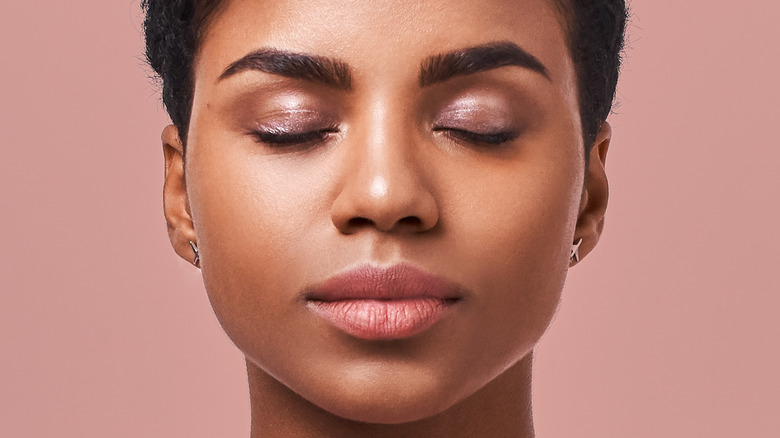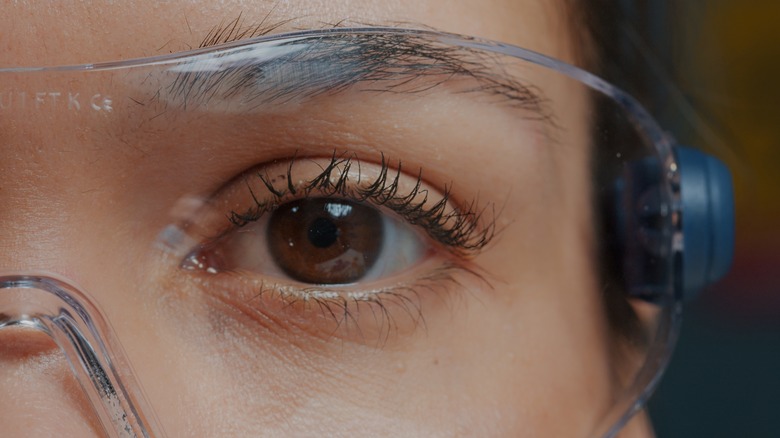The Eye-Opening Scientific Reasoning Behind Why We Blink
Blinking is a bodily reflex we can't avoid. According to Live Science, the average adult blinks anywhere from 10 to 20 times a minute (most of us blink right in the middle of those numbers). That doesn't mean you won't blink faster or slower under certain circumstances. For example, anything that bothers the eye might increase the frequency of blinking. This could be anything from allergies to having something in your eye to crying — and people with poor vision might blink more simply because the eye is trying to "fix" the blurriness.
Here's one interesting insight, though: Babies don't blink anywhere near as often as adults do. According to Live Science, babies only blink a few times per minute, and some babies might blink just once per minute. Scientists believe this could be related to a lower amount of dopamine, which impacts pleasure and emotions produced by the nervous system (per WebMD). While this isn't clearly understood, studies do show that people with conditions like schizophrenia have more dopamine in their brain and blink more, while people with Parkinson's disease experience a decreased production of dopamine and blink a lot less.
Don't worry; babies eventually do grow out of the "staring" stage — by the time they're teenagers, they'll be blinking almost as often as adults do (per The New York Times).
Not all animals blink
Not everybody in the animal world blinks the same way. Certain animals, like snakes and some types of geckos, don't have eyelids and don't blink at all. Geckos that don't blink will keep their eyes moist by licking them with their tongues regularly, according to Insight Care Associates. Snakes, on the other hand, have a transparent scale covering their eyes. This serves a purpose similar to that of eyelids, but since it's there all the time, there's no need to blink (via Phys.org).
Our most popular companions, dogs and cats, blink somewhat differently than we do. Cats, for example, don't close their eyes completely when they blink, so it often looks like they're squinting instead. Plus, as PetMD points out, cats have a third eyelid that closes over the eye diagonally at the same time that the upper and lower eyelid close to meet together in the center. Dogs eyelids do come together (just very briefly) when they blink, according to VetExplainsPets.
Primates, our closest relatives, blink about half as much as we do, with gorillas blinking more than other non-human primates, according to a study posted at Nature. Scientists believe this is because the risk of being attacked by a predator is high in the wild, so blinking is reduced to stay more alert. (We humans blink less when engaged in difficult or stressful tasks, like watching out for predators would be.) Some birds have a similar response in times of danger, according to the study — both wild American crows and adult peacocks blink less or fix their gaze if they sense danger.
The more common reasons we blink
Blinking serves a number of purposes, all connected to keeping eyes healthy. The two main reasons we blink are to keep our eyes lubricated and to get rid of any dust or foreign object that might happen to get in the eye (as reported via LiveScience).
When you blink, a tear "flushes" the eyeball and keeps it moist. This helps prevent blurriness, but also supplies oxygen and fights bacteria, as LiveScience explains. The speed of blinking adapts if the eye "needs help," as would happen if something gets inside your eye, you have inflammation or allergies, or you accidentally poke your eye. In all those cases, blinking more means more tears to help your eye.
A 2012 study also shows blinking might be a basic strategy used by the brain to get a quick rest. We tend to blink less when our eyes are engaged on something like reading or watching a movie, and blinking adapts to the activity so your brain can rest without interrupting you (per Proceedings of the National Academy of Sciences). How? According to the study, when reading something, you'll likely blink at the end of a sentence rather than the middle. Or blink at certain "breakpoints" when watching something, rather than in the middle of an exciting scene.
Other reasons we blink more or less
Humans blink for more than just practical reasons like keeping eyes lubricated. We also blink more or less frequently depending on a number of other factors, including our emotional state. For example, blinking can sometimes speed up due to stress, when somebody is troubled, or when lying, according to Psychology Today. Presidents Richard Nixon and Bill Clinton both had a significant increase in blink rate when they were confronted by the press or during a deposition, likely a result of high stress in both cases.
Blinking seems to carry a lot of information, almost as a form of body language that might affect how we interact with others during a conversation. According to MedicalNewsToday, research shows that blinking more often can signal that we're not paying as much attention during a conversation, but it can also say that we're heavily engaged and our brains are working overtime to process a lot of information.
The brain and eyes are more emotionally in sync than originally thought. For example, a study showed that when a group of people is watching the same video, they all tend to blink at about the same time, at places where the action slows down enough to allow for a logical "break." This allows the break to shut off stimuli and rest before engaging with things again (via Smithsonian Magazine).
Can we live without blinking?
Sorry to say, but no matter how hard you try, you can't stop blinking. But even if you were able to stop, it's not something you would want to do. According to Healthline, your cornea needs the oxygen that tears provide when you blink, so no blinking means your cornea would dry up and start swelling up. You would have pain, blurry vision, and a higher risk of eye infections. And the damage of not blinking starts pretty quickly; you don't have to wait too many minutes to start feeling it.
That's not to say you can't make an effort to blink less, even if it's just on a dare. That's what staring contests are all about. According to Medical Daily, Australian competitors "Stare Master" and "Eyesore" broke the record for looking at each other for 40 minutes and 59 seconds during a charity competition. By the end of the contest, both competitors had red eyes, were shedding tears, and the pain was so intense, one of the contestants confessed it felt like getting a tattoo on his eyeball.
But it's Filipino TV host Paolo Ballesteros who holds the unofficial record for the longest time spent without blinking (unofficial because official records are kept by the Guinness Book of Records, and they don't keep records for this). According to a 2019 report in the New York Post, Ballesteros spent one hour, 17 minutes and three seconds without blinking.




